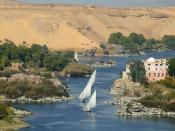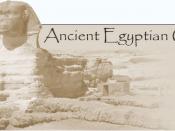Ancient Egypt, civilization that thrived along the Nile River in northeastern Africa for more than 3,000 years, from about 3300 bc to 30 bc. It was the longest-lived civilization of the ancient world. Geographically, the term ancient Egypt indicates the territory where the ancient Egyptians lived in the valley and delta of the Nile. Culturally, it refers to the ways ancient Egyptians spoke, worshiped, understood the nature of the physical world, organized their government, made their livings, entertained themselves, and related to others who were not Egyptian.
The Nile River, which formed the focus of ancient Egyptian civilization, originates in the highlands of East Africa and flows northward throughout the length of what are now Sudan and Egypt Northwest of modern-day Cairo, it branches out to form a broad delta, through which it empties into the Mediterranean Sea. Because of seasonal rains farther south in Africa, the Nile overflowed its banks in Egypt every year.
When the floodwaters receded, a rich black soil covered the floodplain. This natural phenomenon and its effects on the environment enabled the ancient Egyptians to develop a successful economy based on agriculture.
Other natural factors combined to give rise to a great civilization in the Nile region. In Egypt's relatively cloudless sky the Sun almost always shone, consistently providing heat and light. The Nile served as a water highway for the people, a constant source of life-giving water, and the sustainer of all plants and animals. In addition, natural barriers provided good protection from other peoples. The desert to the west, the seas to the north and east, and the Nile's rapids, or cataracts, to the south prevented frequent hostile attacks.
In this setting a sophisticated and creative society came into being. That society was the only one in the area to endure...


